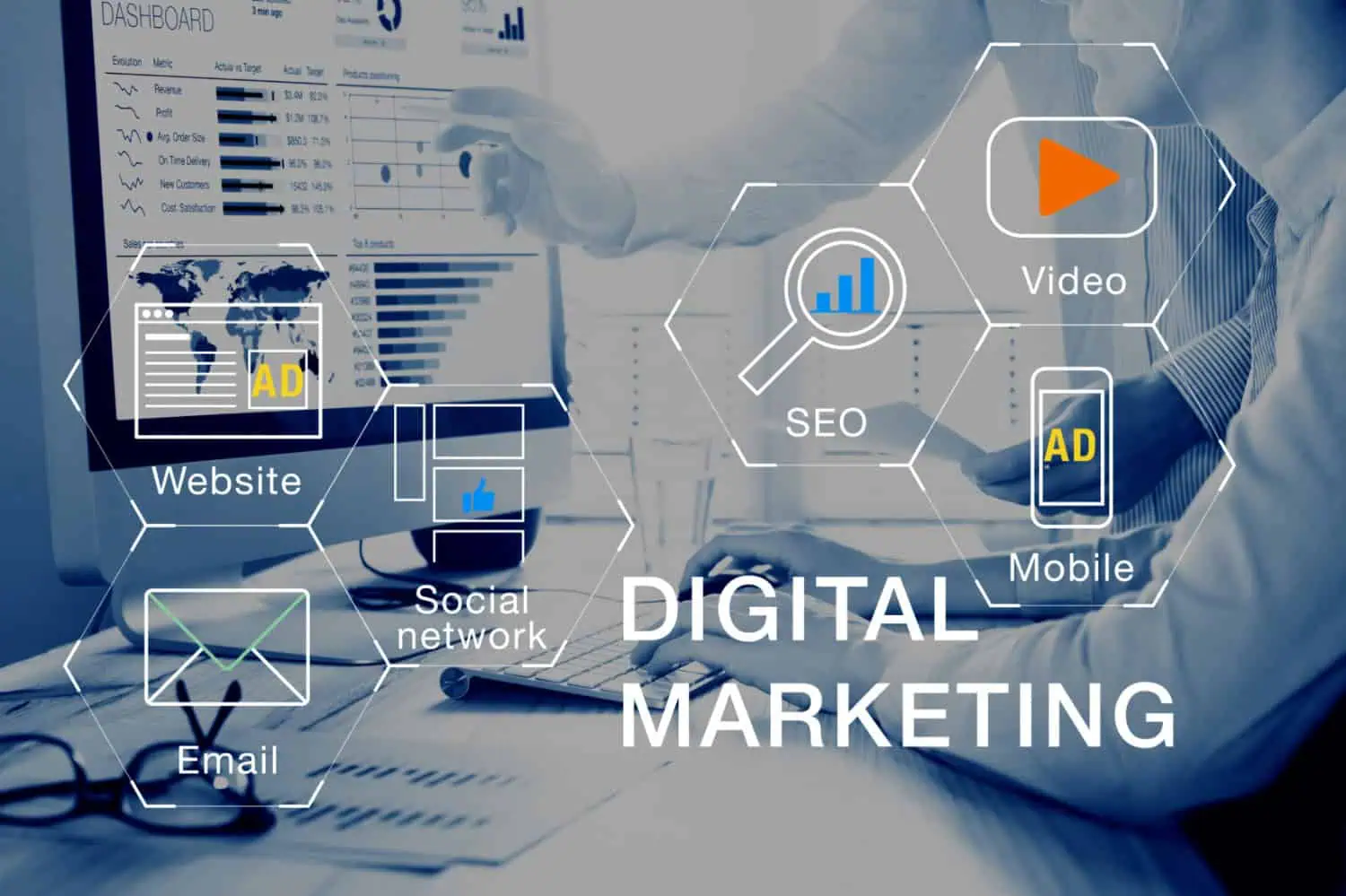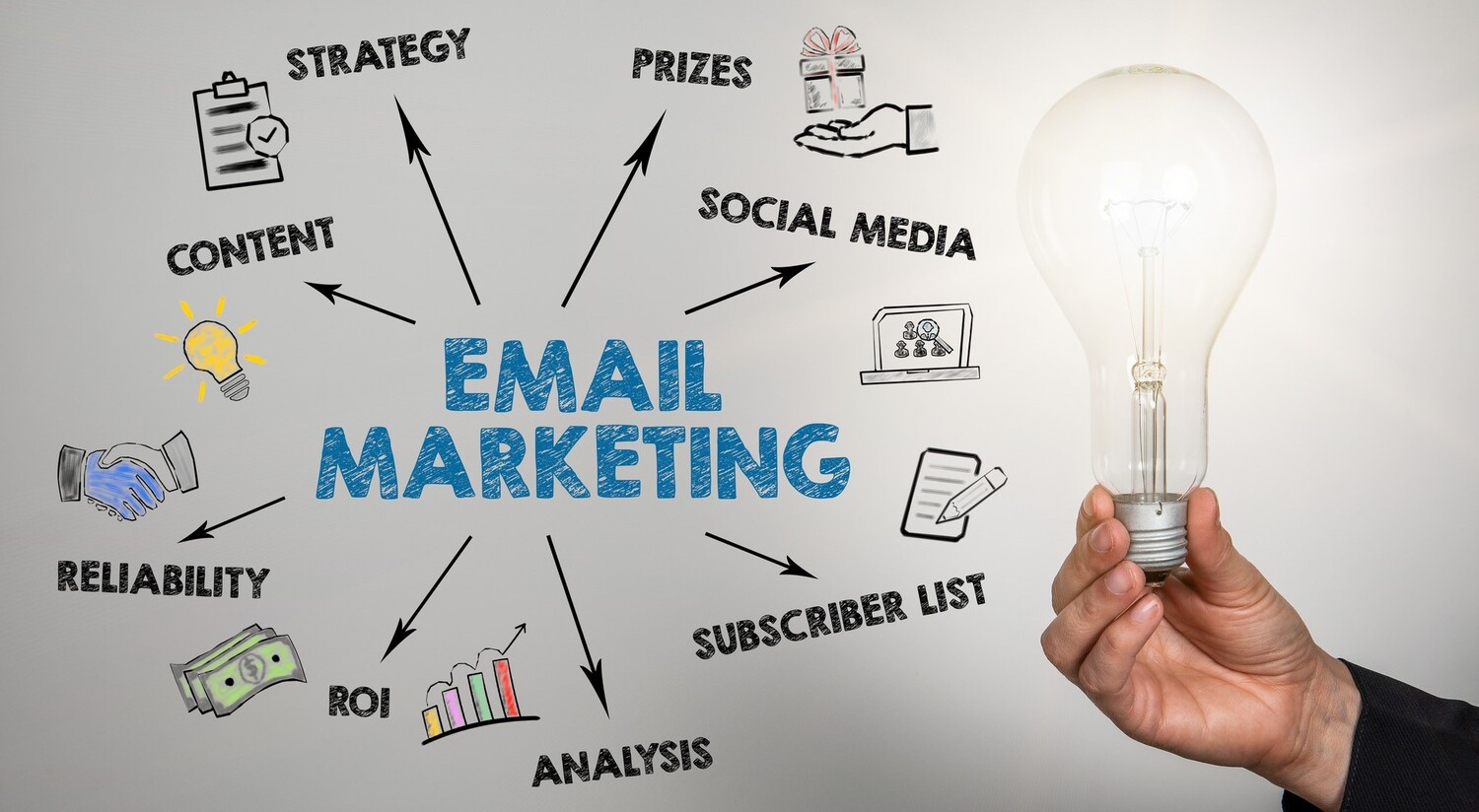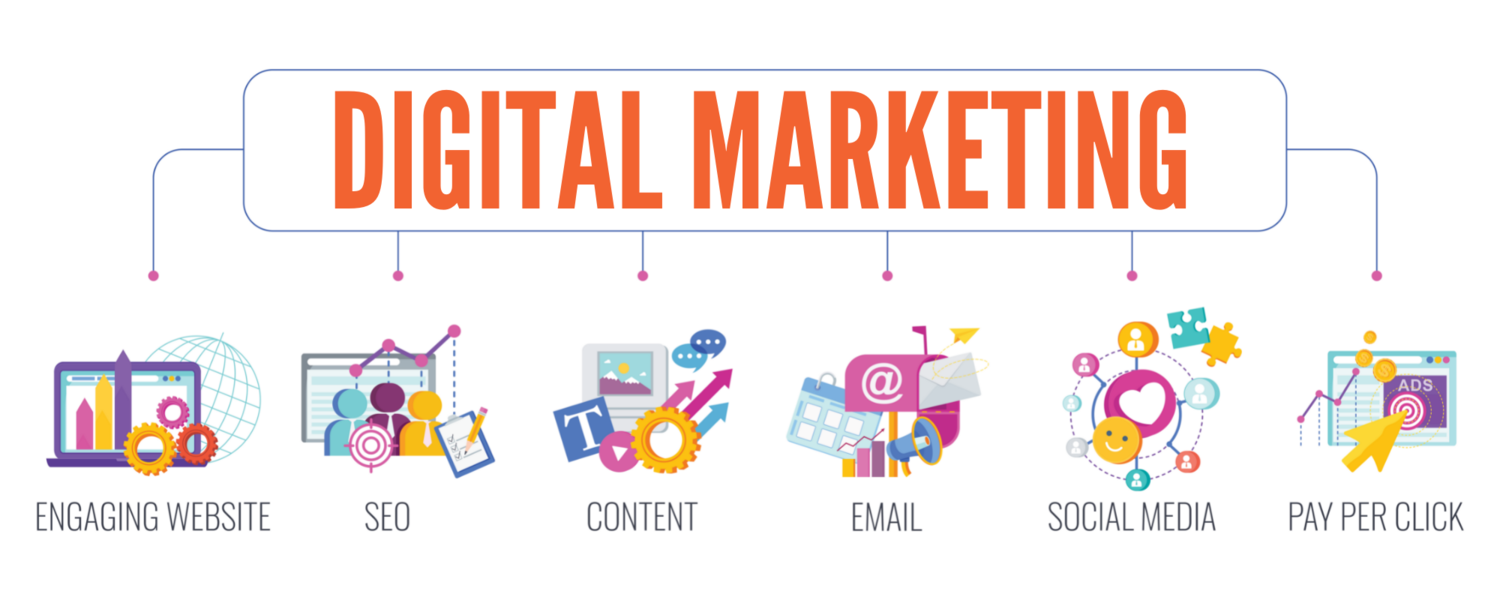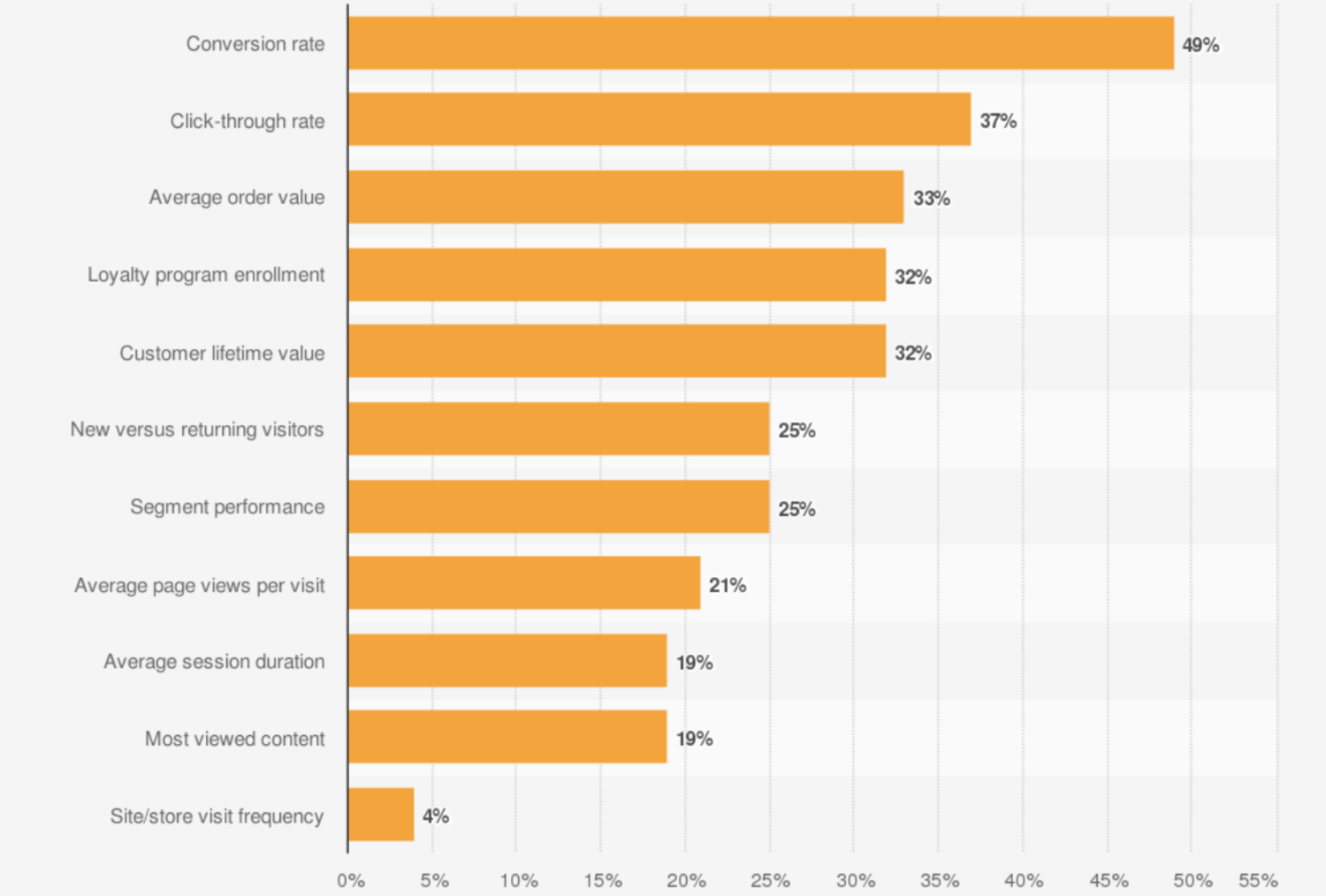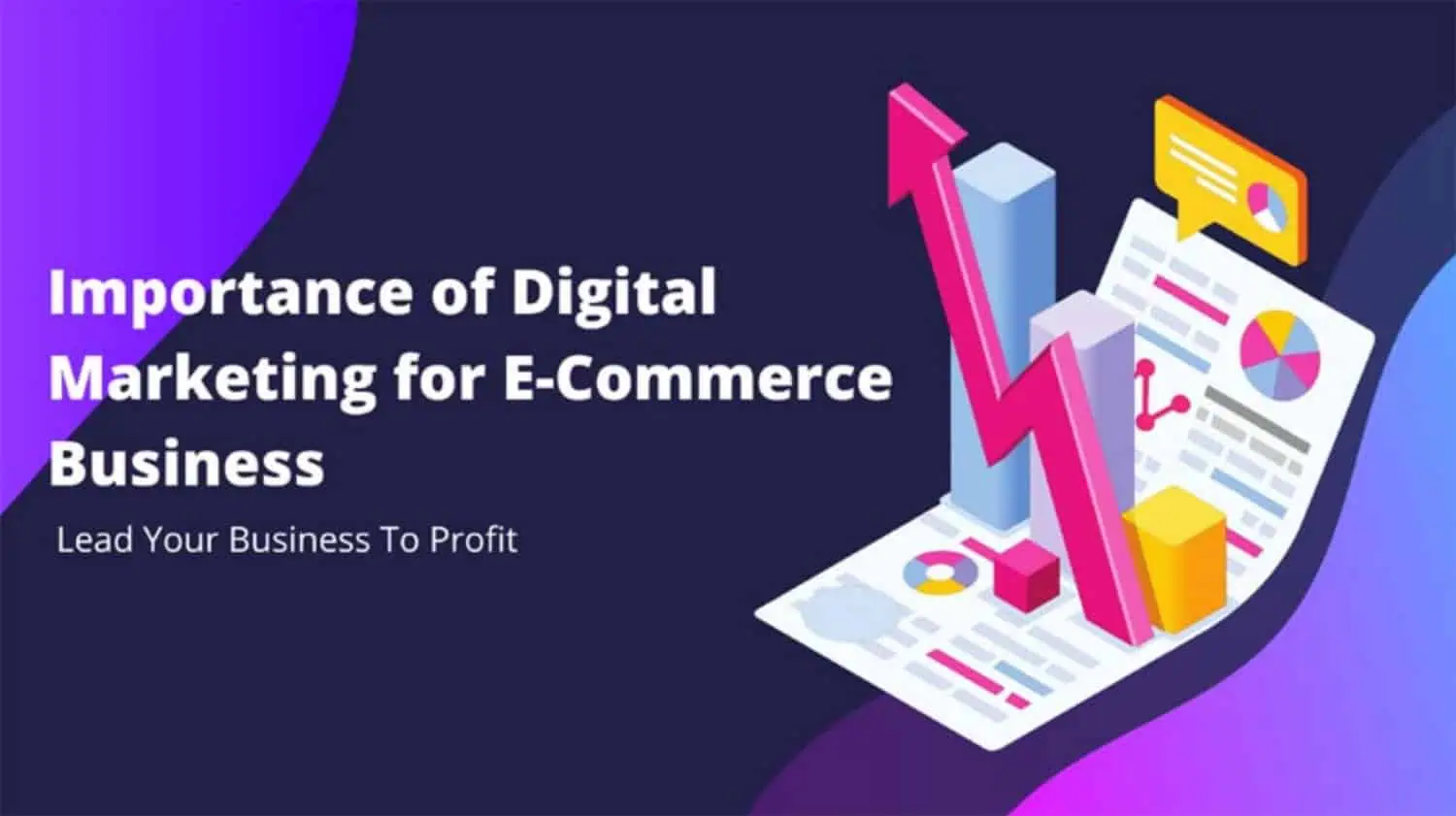In today’s fast-changing digital world, e-commerce and digital marketing are two essential components of the modern company ecosystem. While they appear to be closely connected, it is necessary to understand that they have various functions and contribute in different ways to the success of online enterprises.
E-commerce and digital marketing are indispensable for online success. E-Commerce reaches a broader audience, increases sales, and reduces costs. Digital marketing builds brand awareness, generates leads, and increases website traffic.
In this article, we will look at the fundamental contrasts between digital marketing and e-commerce, focusing on their distinct purposes and advantages and how they support one another in attaining corporate goals.
E-Commerce vs Digital Marketing: What is E-Commerce?
E-commerce refers to purchasing and selling goods and services through the Internet. It encompasses the complete online purchase process, from browsing and selecting through payment and delivery. E-commerce platforms give businesses a virtual storefront to promote their products or services, allowing customers to buy conveniently.
See also: Lazada Marketing Strategy: Everything to Know About Success
Benefits of E-Commerce:
- Global reach: Businesses can offer services to clients worldwide.
- 24/7 availability: Customers can shop anytime, anywhere.
- Cost-effectiveness: E-commerce can be more cost-effective than traditional retail.
- Personalization: E-commerce businesses can personalize the shopping experience for each customer.
- Enhanced customer insights: Online businesses can gather client information to improve their offerings.
- Streamlined inventory management: E-commerce businesses can manage their inventory more efficiently.
- Easy payment processing: Customers can quickly pay for their purchases online.
Examples of E-Commerce:
1. Amazon: As one of the world’s leading e-commerce platforms, Amazon offers diverse items and services, ensuring customers a convenient and dependable online shopping experience.
See also: 9 Easy Ways on How To Increase Sales On Amazon
2. Shopify: Shopify is a prominent e-commerce system that helps businesses quickly set up and run their online stores by providing a variety of configurable layouts and connectors.
3. Zappos: Specializing in footwear and clothes, Zappos is an e-commerce shop noted for its excellent customer care and hassle-free return policy.
What is Digital Marketing?
In contrast, digital marketing comprises various online advertising strategies to build brand recognition, attract new consumers, and drive sales. It entails using digital channels strategically, such as search engines, social media, email marketing, content marketing, and others, to interact with the audience that is being targeted and encourage them to engage with the business.
See also: Digital Marketing Methodology: Your Ultimate Guide
Benefits of Digital Marketing:
- Targeted marketing: Ensure the appropriate audience hears your message.
- Cost-effective: Get results without breaking the bank.
- Real-time analytics: Track your progress and make adjustments as needed.
- Increased brand awareness: Get your name out there and establish your brand.
- Interactivity and engagement: Connect with your customers and build relationships.
- Measurable ROI: Examine the outcomes of your marketing activities to ensure they are worthwhile.
Examples of Digital Marketing:
1. Google Ads: Previously known as Google AdWords, it is a pay-per-click advertising network that allows businesses to post adverts on Google’s search engine results pages as well as other websites that are members of the Google Display Network.
2. Facebook Advertising: The platform allows businesses to target a particular population, interests, and actions, delivering ads to a highly relevant population.
3. Content marketing: Companies like HubSpot and Moz use content marketing to provide helpful information, such as blog articles, videos, and data visualizations, to draw in and keep their target audience.
4. Social Media Influencer Marketing: Brands collaborate with social media influencers to promote their products or services to followers, using the influencer’s reputation and reach.
5. Email Marketing: Businesses use email marketing to deliver tailored messages, discounts, and customer updates, nurturing connections and promoting repeat purchases.
See also: 9 Email Marketing Advantages & Disadvantages To Know
Understanding marketing functions is essential for businesses to promote their products and services in the market effectively.
E-Commerce vs Digital marketing: What are the Primary Goals?
E-Commerce: The main objective of e-commerce is to make online purchasing and selling of items and services more accessible, safer, and more convenient. It seeks to provide a consistent user experience, improve conversion rates, and assure customer happiness throughout the buying process.
Digital marketing: Digital marketing promotes a company, its goods, and services to a larger audience via various digital channels. The ultimate aim is to raise brand awareness, boost website traffic, and attract potential consumers, generating leads and eventually turning them into paying customers.
Check this out: 10 Digital Marketing Mistakes to Avoid
Key Elements: E-commerce vs Digital Marketing
E-Commerce:
The functioning of the online shop is at the heart of e-commerce. This is part of creating a user-friendly website with easy navigation, appealing product displays, secure payment gateways, and fast order processing and fulfillment systems. Customer service and after-sales support are critical components of a successful e-commerce enterprise.
Digital Marketing:
Search engine optimization (SEO), pay-per-click (PPC) advertising, content marketing, email marketing, influencer marketing, social media marketing, and other tactics and approaches are all part of digital marketing.
These elements are critical to increasing brand awareness, boosting traffic, and attracting potential buyers across various digital platforms.
Role in Business Development: E-commerce vs Digital Marketing
E-commerce:
E-commerce immediately adds to business income growth. It helps convert prospects into paying consumers by offering online transaction platforms. A well-optimized e-commerce website may substantially influence a company’s bottom line, especially given customers’ growing preference for online purchasing.
Digital Marketing:
The main reason behind bringing potential customers to the e-commerce platform is digital marketing. Businesses may reach their target audience, create brand loyalty, and cultivate client connections by utilizing numerous Internet marketing tactics. Digital marketing is critical in raising target audience awareness, interest, desire, and action (AIDA), ultimately directing them to the e-commerce platform for conversion.
Check this out: What are the Principles of Digital Marketing? Learn Everything
Measuring and Analyzing: E-commerce vs Digital Marketing
E-Commerce:
Metrics like the conversion rate, average value of orders, customer lifetime value (CLV), cart abandonment rate, and total sales performance are used to evaluate the effectiveness of an e-commerce platform. These metrics give helpful information about an online store’s version and help firms discover areas for development.
Digital Marketing: Depending on the unique goal of each campaign, multiple key performance indicators (KPIs) are used to measure digital marketing efforts. Internet traffic, rate of click-through (CTR), conversion rates, engagement metrics, social media analytics, and return on investment (ROI) are examples. Analyzing these indicators allows marketers to understand their initiatives’ effects better and optimize future efforts.
Collaboration and Synergy
E-commerce and digital marketing:
While digital marketing and e-commerce serve diverse goals, they are naturally interwoven and mutually reinforcing. A well-executed digital marketing plan generates visitors to the e-commerce platform, improving sales and income possibilities.
At the same time, a seamless and efficient e-commerce website improves the entire consumer experience, which boosts the efficiency of digital marketing activities by generating good feedback and brand loyalty.
FAQs
What is the main difference between e-commerce and digital marketing?
E-commerce is online buying and selling. It involves setting up a virtual storefront, managing transactions, and ensuring a good user experience. Digital marketing is promoting a business online through various channels.
Can e-commerce exist without digital marketing, or vice versa?
E-commerce can exist without digital marketing, but it won't be as successful. Digital marketing drives traffic attracts customers, and creates brand awareness. E-commerce converts leads into paying customers. For best results, use both.
How does digital marketing help e-commerce businesses grow?
Digital marketing helps e-commerce businesses grow by increasing brand visibility, driving traffic, and engaging customers. It also facilitates customer retention and loyalty.
What are the key metrics to measure the success of an e-commerce platform?
The key performance measures for assessing the success of an e-commerce platform are Conversion rate, Cart abandonment rate, Average order value, Overall sales performance, and Customer lifetime value.
How does digital marketing impact e-commerce conversion rates?
Digital marketing can attract qualified traffic and boost e-commerce conversion rates. Target the right people with SEO, PPC, and other channels. Use effective strategies with user experience and persuasive content.
Conclusion
To summarize, e-commerce and digital marketing are independent yet interconnected elements of today’s corporate scene. E-commerce is concerned with facilitating online transactions and earning income, whereas digital marketing is concerned with increasing brand awareness and attracting new customers.
Businesses may design integrated strategies that harness the capabilities of both to meet their growth and profitability targets in the highly competitive digital world by recognizing the distinct roles of e-commerce and digital marketing.
E-commerce and digital marketing must work together for businesses to flourish and succeed in the ever-changing online marketplace.






